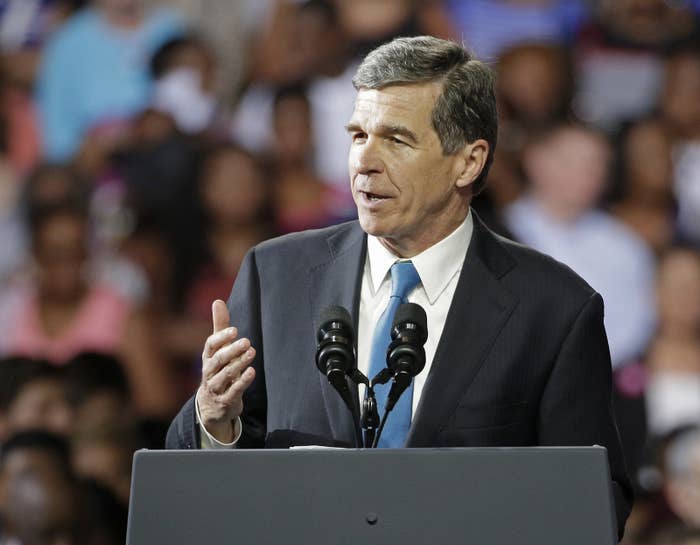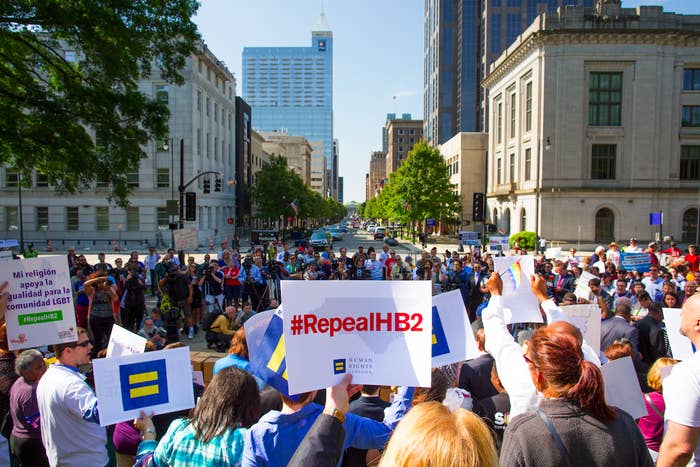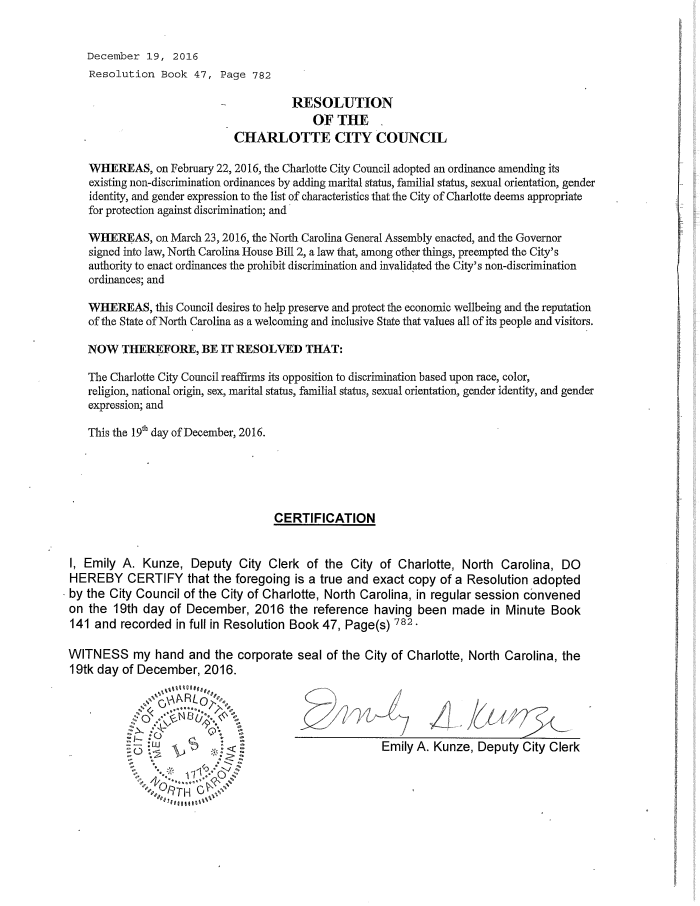
North Carolina Republicans and Democrats announced a deal on Monday to repeal a state law that drew national boycotts for restricting transgender people's use of public bathrooms.
As part of the agreement, the city of Charlotte offered concessions that have drawn mixed reactions from LGBT advocates. On Monday, the city council voted unanimously to repeal its LGBT nondiscrimination ordinance on the condition that the state acts in turn by Dec. 31.
The deal was overseen by Democratic Gov-elect Roy Cooper, who had run on a platform of blasting the state law, knowns as HB2, which also preempted local LGBT ordinances, including the one in Charlotte.
“Senate Leader Phil Berger and House Speaker Tim Moore assured me that as a result of Charlotte’s vote, a special session will be called for Tuesday to repeal HB2 in full,” Cooper said in a statement about the Republican-controlled legislature. “I hope they will keep their word to me and with the help of Democrats in the legislature, HB2 will be repealed in full.”
Republican Gov. Pat McCrory’s office confirmed he will call a special legislative session to repeal HB2 on Tuesday.
The Charlotte ordinance, passed by the city council in February, had added marital and familial status, sexual orientation, gender expression, and gender identity to the list of protected characteristics on which individuals cannot be discriminated against by businesses or public accommodations.
In response, the North Carolina legislature hastily convened in a March special session to pass HB2, which preempted the Charlotte ordinance and also banned many transgender people from using restrooms in government buildings that match their gender identity.
While proponents argued the state law protected women from transgender people, HB2 drew national attention and prompted massive backlash from LGBT activists and their supporters, prompting businesses and celebrities to boycott the state.
McCrory, who signed the law, narrowly lost his re-election bid, conceding defeat to Cooper earlier this month.

The Charlotte ordinance was repealed Monday in a unanimous 10-0 vote by the city council, the Charlotte Observer reported. Mayor Jennifer Roberts called the move "the first concrete opportunity to repeal HB2," according to the newspaper.
However, Roberts held a different stance in September, when the city and state considered a similar deal that she rejected, saying in a statement at the time that "the state should overturn HB2, which the state can do at any time without any action from the City of Charlotte."
In a statement Monday, the city council said it took the vote now because officials recognized "the ongoing negative economic impact resulting from the passage" of the ordinance and HB2.
"In order to continue thriving as an inclusive community and compete for high paying jobs and world-class events, the city and state must take action together to restore our collective reputation," Charlotte officials said.
McCrory had long argued the state law was necessary to protect the privacy of women and girls from transgender people — a message he maintained on Monday. "Now that the Charlotte ordinance has been repealed, the expectation of privacy in our showers, bathrooms and locker rooms is restored and protected under previous state law," said a statement from his office. "Governor McCrory has always publicly advocated a repeal of the overreaching Charlotte ordinance. But those efforts were always blocked by Jennifer Roberts, Roy Cooper, and other Democratic activists."
"This sudden reversal with little notice after the gubernatorial election sadly proves this entire issue originated by the political left was all about politics and winning the governor’s race at the expense of Charlotte and our entire state," the governor's office statement continued. "As promised, Governor McCrory will call a special session."
The country's top LGBT group, the Human Rights Campaign, declined to support or oppose the deal on Monday — even though the organization fought to elect Cooper and credited Cooper with brokering the deal. "Charlotte did the right thing in passing their nondiscrimination protections — protections more than 100 cities across the United States have in place," spokesman Jay Brown said. "What we've always supported is the full and complete repeal of HB2."
But pressed to explain if the group supported repealing both the city ordinance and the state law, Brown did not reply to inquiries on Monday.
Other groups were bluntly condemned the idea that LGBT rights were repealed as part of the deal. Simone Bell, the southern regional director for Lambda Legal, said in a statement that “LGBT rights aren’t a bargaining chip. Charlotte shouldn’t have had to repeal its ordinance in exchange for H.B. 2 to be repealed. LGBT people in North Carolina still need protection from discrimination."
Mara Keisling, executive director of the National Center for Transgender Equality, indicated the deal was mixed bag.
"We are disappointed that Charlotte’s commonsense ordinance was repealed in order to get the General Assembly to even consider a full repeal of HB 2," Keisling said in a statement.
But she suggested the deal provides opportunities to pass local LGBT ordinances in the future.
"A full repeal of HB 2 will open a pathway for not only Charlotte, but also other cities in North Carolina, to pass protections in the future and ensure fairness for all their residents," Keisling added.
Cooper said he hoped the repeal of HB2 would bring jobs back to the state: "Full repeal will help to bring jobs, sports and entertainment events back and will provide the opportunity for strong LGBT protections in our state."


